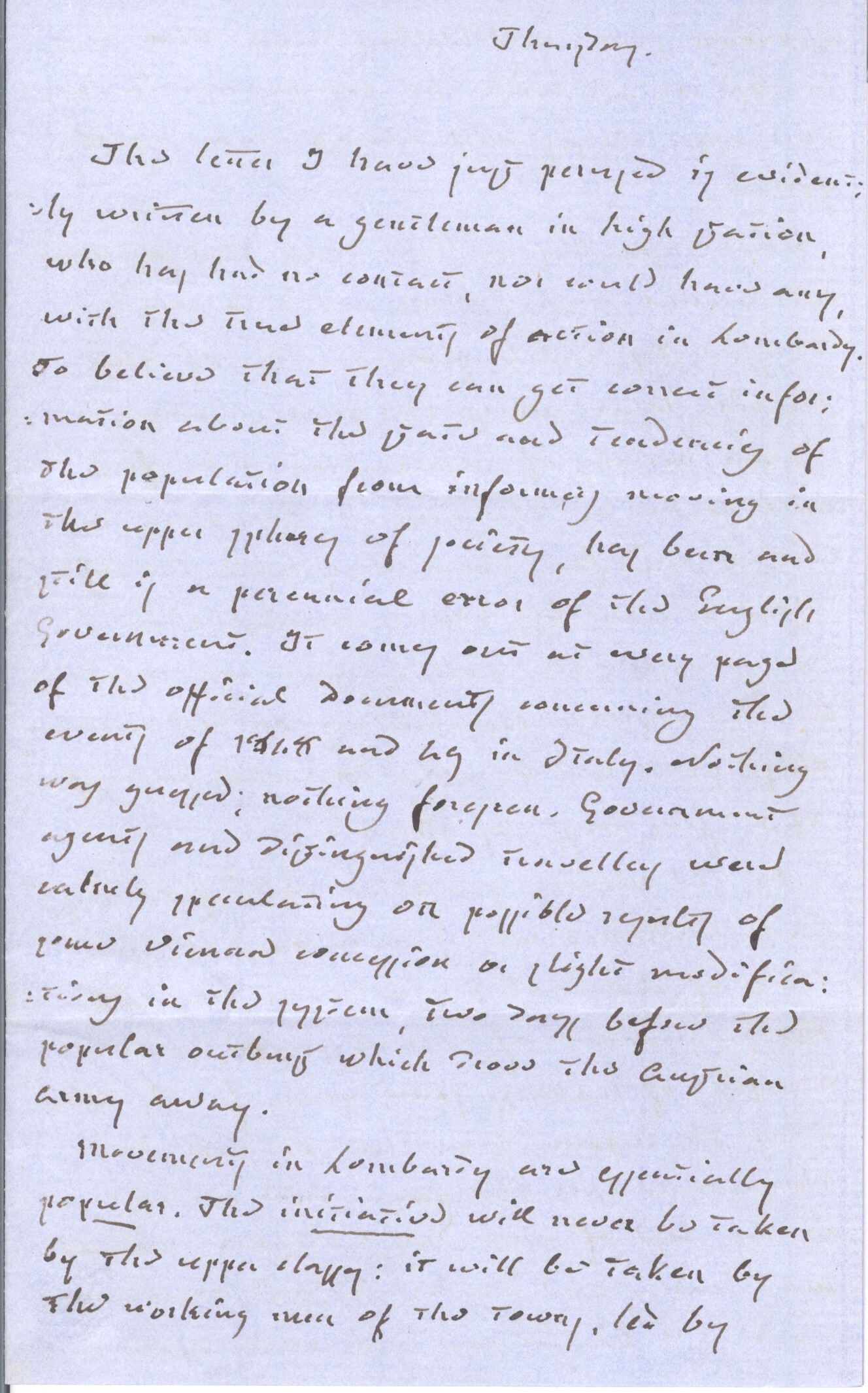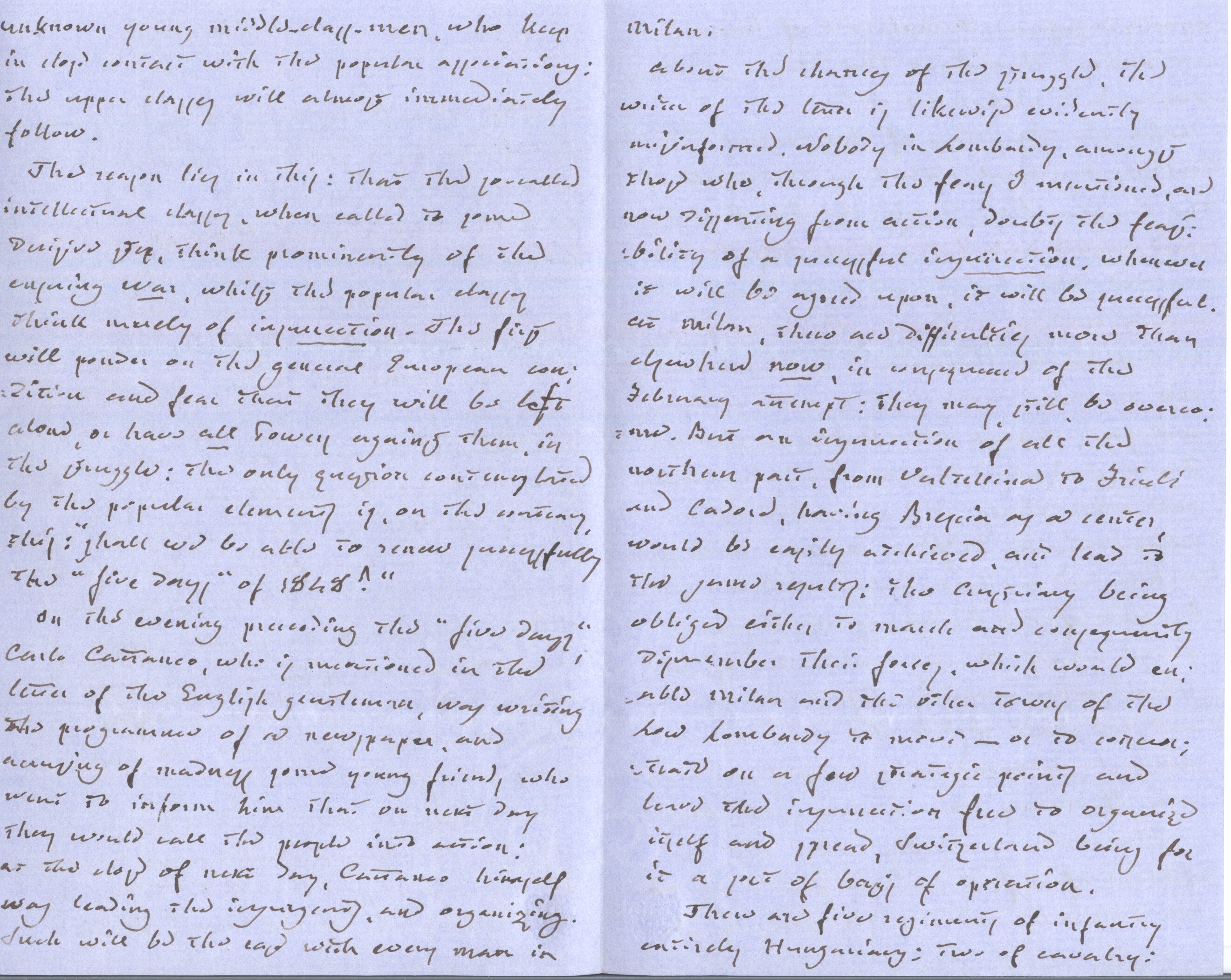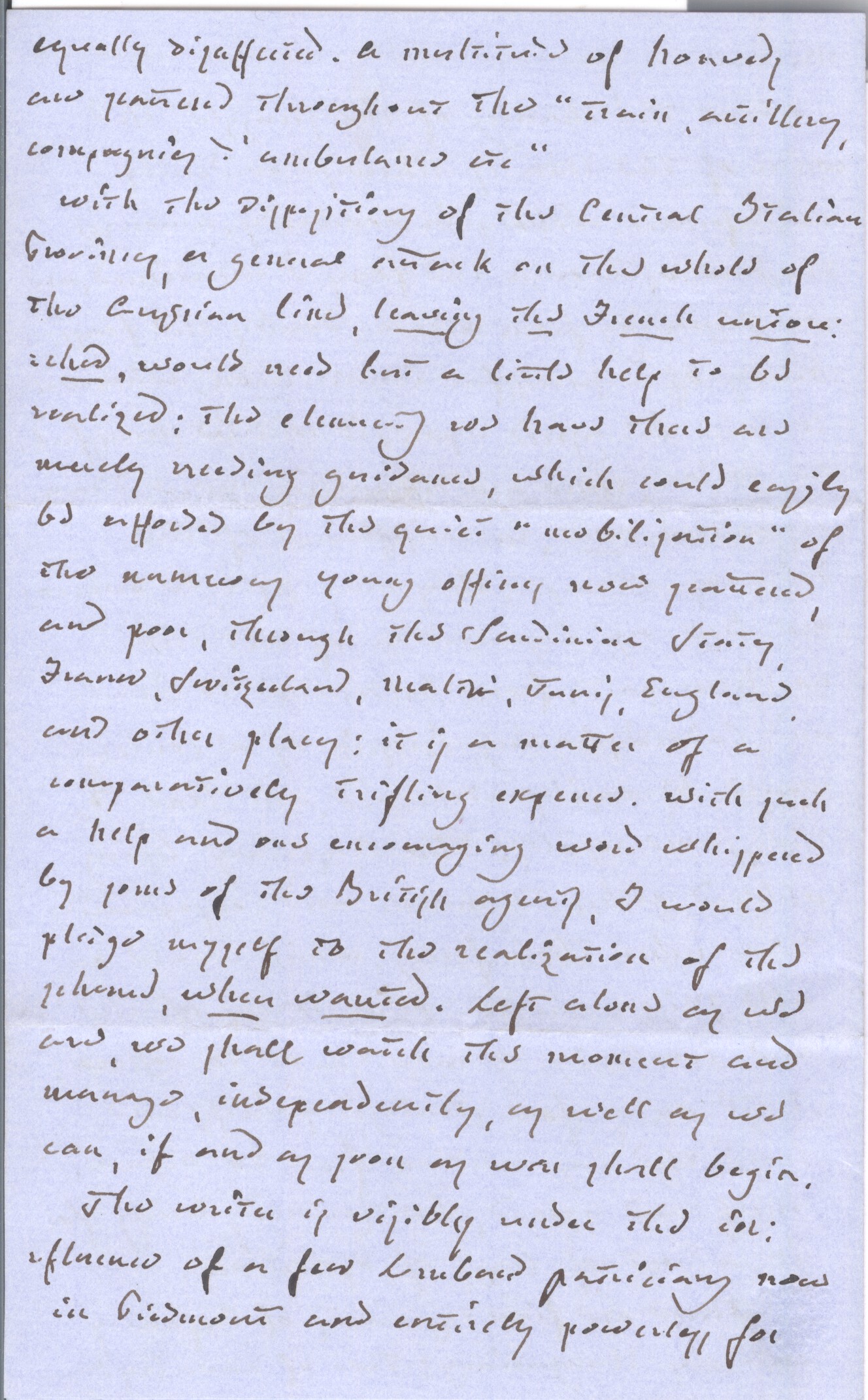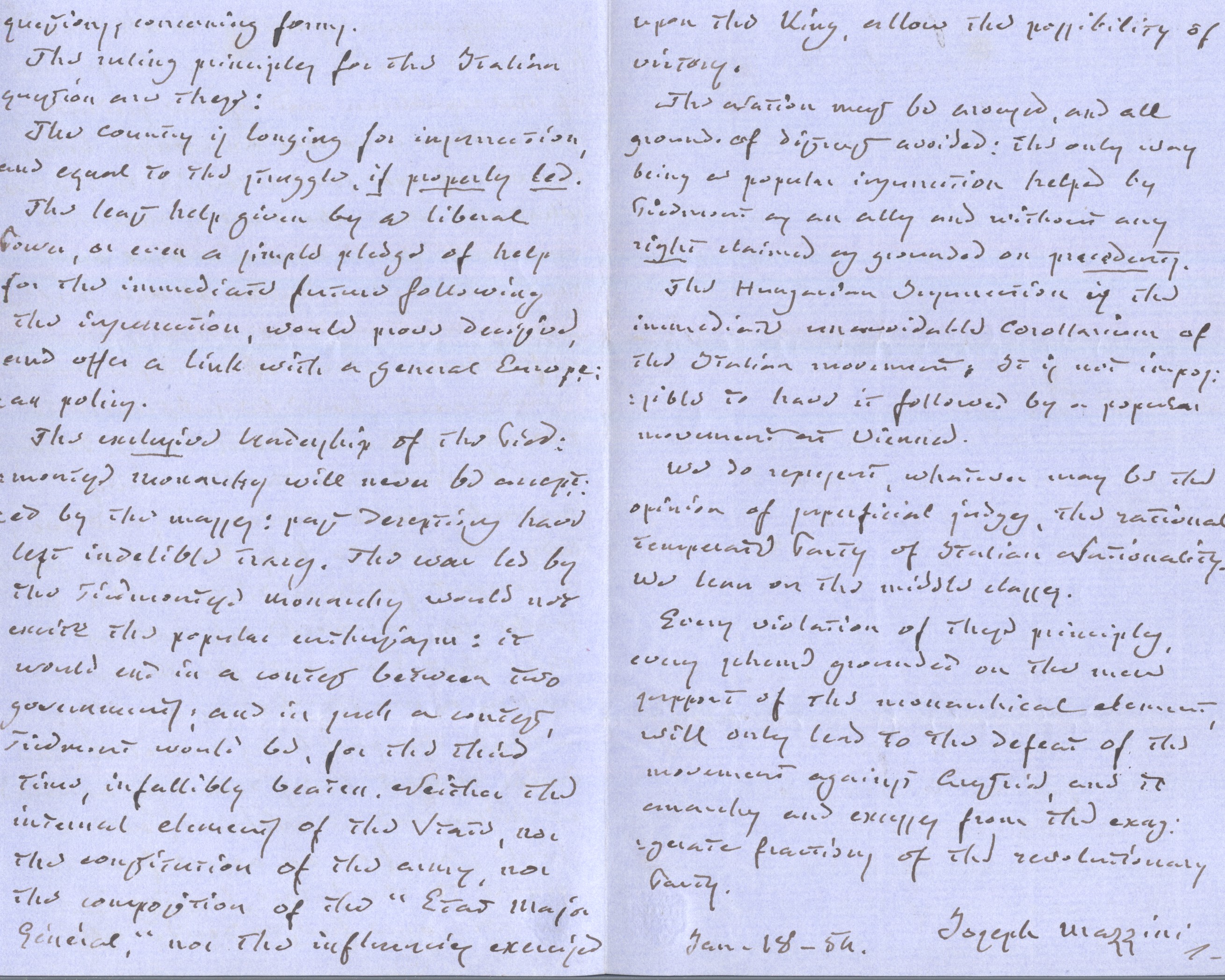
MAZZINI
(Giuseppe, 1805-1872, Italian patriot, with Cavour & Garibaldi he accomplished the unification of Italy)
Important UNPUBLISHED lengthy Autograph Report Signed "Joseph Mazzini" in English to an unnamed correspondent
saying that the "letter I have just perused is evidently written by a gentleman in high station who has had no contact nor would have, with the true elements of action in Lombardy. To believe that they can get correct information about the state and tendencies of the population from informers moving in the upper spheres of society has been and still is a perennial error of the English Government. It comes out at every page of the official documents concerning the events of 1848 and 49 in Italy. Nothing was guessed, nothing foreseen - Government agents and distinguished travellers were calmly speculating on possible reports of some Vienna concession or slight modifications in the system, two days before the popular outburst which drove the Austrian army away. Movements in Lombardy are essentially popular. The initiative will never be taken by the upper classes. It will be taken by the working men of the towns, led by unknown young middle class men who keep in close contact with the popular associations; the upper classes will almost immediately follow. The reason lies in this: that the so called intellectual classes, when called to some decisive step think prominently of the ensuing war, whilst the popular classes think merely of insurrection; The first will ponder on the general European condition and fear that they will be left alone, or have all powers against them in the struggle; the only question contemplated by the popular elements is, on the contrary this - shall we be able to renew successfully the 'five days of 1848'. On the evening preceding the 'five days' Carlo Cattaneowho is mentioned in the letter of the English gentleman was writing the programme of a newspaper and accusing of madness some young friend who went to inform him that on the next day they wouldlcall the people into action. At the close of next day Cattaneo himself was leading the insurgents and organising. Such will be the case with every man in Milan. About the chances of the struggle the writer of the letter is likewise evidently uninformed. Nobody in Lombardy amongst those who, through the fears I mentioned are now dissenting from action, doubt the feasibility of a successful insurrection, whenever it will be agreed upon it will be successful. At Milan there are difficulties more than elsewhere now, in consequence of the February attempt they may still be overcome. But an insurrection of all the northern part, from Valltellina to Fricoli and Cadore having Brescia as a centre would be easily achieved and lead to the same results, the Austrians being obliged either to march and consequently dismember their forces which would enable Milan and the other towns of the Low Lombardy to move - or to concentrate on a few strategic points and leave the insurrection free to organise itself and spread. Switzerland being for it a sort of basis of operation. There are five regiments of infantry entirely Hungarians; two of cavalry equally disaffected. A multitude of ... scattered thoughout the 'train, artillery compagnies, ambulance etc'. With the dispositions of the central Italian Provinces a general attack on the whole of the Austrian line, leaving the French untouched, would need but a little help to be realised; the elements we have there are merely needing guidance which could easily be afforded by the quiet mobilisation of the numerous young officers now scattered and poor through the Sardinian States, France, Switzerland, Malta, Tunis, England and other places. It is a matter of a comparatively trifling expense. With such a help and our encouraging word whispered by some of the British Agents I would pledge myself to the realization of the scheme when wanted. Left alone as we are, we shall watch the moment and manage independantly, as well as we can, if and as soon as war shall begin. The writer is visibly under the influence of a few Lombard patricians now in Piedmont and entirely powerless for anything concerning action in all that he says or implies concerning the position of the Republican and of he Piedmontese party. There is no real antagonism between the men of good sense belonging to the two. What we want above all is that the movement should be a National one, tending to the constitution of our Italian country - what we do not want is that a fractionary scheme of a Simple dynastic agrandizement should be substituted to the aim of the National party. it was once believed that the Piedmontese Monarchy would achieve it and every body was ready to help. Even now should a compact for immediate action be sought for, we would ask nothing but this; that Piedmont should proceed not as a master but as an ally, that the past being cancelled, the Fusion compact being deemed as cancelled at Milan and at Novara, action should start from an appeal from the present to the future, leaving the country once free to decide all questions concerning forms. The ruling principles for the Italian question are these: The country is longing for insurrection, and equal to the struggle if properly led. The least help given by a liberal Power, or even a simple pledge of help for the immediate future following the insurrection would prove decisive, and offer a link with a general European policy. The exclusive leadership of the Piedmontese Monarchy will never be accepted by the masses; past deceptions have left indelible traces. The war led by the Piedmontese Monarchy would not excite the popular enthusiasm; it would end in a contest between two governments, and in such a contest Piedmont would be, for the third time, infallibly beaten. Neither the internal elements of the State, nor the constitution of the Army, nor the composition of the 'Etat Major Général' nor the influences exercised upon the King, allow the possibility of victory. The Nation must be roused all grounds of distrust avoided. The only way being a popular insurrection helped by Piedmont as an ally and without any right channel as grounded on precedents. The Hungarian insurrection is the immediate unavoidable Corollarium of the Italian movement - It is not impossible to have it followed by a popular movement at Vienna. We do represent, whatever may be the opinion of superficial judges, the rational temperate party of Italian nationality. We lean on the middle classes. Every violation of these principles, every scheme grounded on the mere support of the monarchical element will only lead to the defeat of the movement against Austria and to anarchy and excesses from the exaggerate fractions of the revolutionary party ...", 7 sides 8vo., 18th January
During his long exile Mazzini found refuge in London from 1837.
Carlo CATTANEO (1801-1869) was an Italian philosopher and writer, famous for his role in the Five Days of Milan on 18th March 1848, when he led the city council during the rebellion. The Five Days of Milan were a major event in the Revolutionary Year of 1848 and the start of the First Italian War of Independence. The five days of street fighting drove Marshal Radetzky and his Austrian soldiers from the city.
Item Date:
1854
Stock No:
39394




<< Back